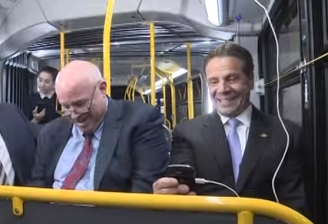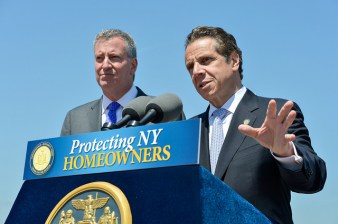OPINION: Cuomo and Murphy Must Sign the Transportation and Climate Initiative
Our transit systems and environment urgently need the regional agreement, a policy analyst argues.


An emerging bipartisan consensus is proposing a solution to our congestion and pollution crises: A proposal is taking shape in the Northeast to make polluters pay for the emissions they produce and to use the proceeds to create the clean transportation future tens of millions of commuters need. The Transportation and Climate Initiative policy, a compact comprising 11 states and the nation’s capital, puts a price on carbon across the transportation sector; revenues will be used to fund infrastructure investments that will not only dramatically reduce emissions, but also spur businesses to innovate in smarter ways to move people and products.

The agreement is just one tool for fighting transportation emissions, but given that massive funding shortfalls imperil clean transportation, governors must embrace the policy now. Fortunately, many — both Republicans and Democrats — are in favor of TCI; in a few weeks, several states will sign on to start this regional program, which will save lives and reduce commutes across the eastern seaboard. A final memorandum of understanding will come out this month. We must ensure that Govs. Cuomo and Murphy sign it, too.
We’ve never had a more critical moment to get serious about these issues: Some jobs are expected to stay remote, but the vast majority will not. Those returning to work will need dependable transit; without it, the region’s highways and roads will be gridlocked. Letting public transit collapse as we crawl out of a public-health crisis would be a disaster that our elected leaders must avoid. The traditional funding streams for transit — fares, sales taxes, and toll revenue — won’t keep buses and trains running, let alone transition to the green transportation system our region needs in order to combat climate change, pollution, and traffic.
Urge @NYGovCuomo to make NY a leader in this once in a generation opportunity to transform New York’s transportation to be healthier, more equitable & sustainable with a #TCI program. Sign today – https://t.co/ExmxhKqTn1 #NYforTCI pic.twitter.com/emwLUyElJD
— NY for Clean Power (@NYforCleanPower) November 23, 2020
TCI has the potential to reshape our commutes, but the benefits don’t end there: COVID-19 has demonstrated that, for thousands of Americans, air pollution is a death sentence. Many studies show that exposure to air pollution directly correlates with COVID-19 mortality. As any resident of a neighborhood near a highway, port, or other major shipping facility will tell you, vehicular traffic stokes severe respiratory illness. TCI revenues also could fund the electrification of our transportation system, making it cheaper and easier to own an electric car, delivery vehicle, or tractor-trailer. Because the majority of transportation pollution comes from tailpipes, we could eliminate a major source of illness and death.
In a year of economic and public-health crises, TCI would require polluters to help solve the biggest dilemmas of our time. First, the policy creates a regional cap on allowable emissions from on-road fuels, diesel and gasoline, that will lessen over time and allow fewer and fewer emissions from the fuel that gas and diesel companies sell. Major fuel suppliers will need to buy carbon allowances in proportion with the pollution those fuels generate, which will be sold at auctions in the region within the cap. As the cap lowers over time, fuel suppliers must reduce the pollution from their fuels, switching to cleaner options and paying more for the existing carbon allowances. The proceeds from these auctions would go to cleaning and greening how we get around and bolstering our public transit services.
Major infrastructure projects, such as Amtrak’s Gateway program, the Port Authority Bus Terminal replacement, and the expansion of Metro-North service in the Bronx, could benefit from TCI funding. Flashy projects aside, TCI may support equally important municipal transportation projects, such as complete and green streets initiatives. All these projects will stimulate the economy, reduce emissions, and create jobs.
As we rebuild after the pandemic, polluters should pay for the poor air quality and emissions their pollution causes. In order to do so, we need the leaders of the region’s two biggest states to join their counterparts in signing onto TCI this year. New York and New Jersey often think of themselves as leaders in the climate fight; if we really want to live up to that image, we can’t let ourselves be outflanked by Republican governors in other states. Instead, we should join together to create a program that will improve the lives and livelihoods of tens of millions of Americans.
Lauren Bailey is the director of climate policy at the Tri-State Transportation Campaign.


